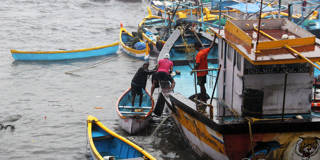Cyclone Ockhi has made painfully clear that all is not well for India’s fishing communities. To prevent the next natural disaster from causing so much damage and inflicting so much pain, India's government must take action to improve disaster prediction and response, as well as to strengthen fishing communities' long-term economic prospects.
NEW DELHI – Last month, a devastating cyclone swept the southern tip of India, causing immense damage to parts of Kerala, Tamil Nadu, and Lakshadweep. Most victims of the oddly named Cyclone Ockhi were fishermen from the districts of Thiruvananthapuram (in Kerala) and Kanyakumari (in Tamil Nadu) who, owing to the lack of a timely cyclone alert, had ventured out to sea, unaware of the danger. Their tragedy highlights the extreme vulnerability of India’s poor coastal communities to the vagaries of nature.
So far, Ockhi is known to have taken 245 lives, with 661 still missing, many of whom were lost at sea and are unlikely ever to be found. Moreover, nearly 3,500 homes were damaged in Kerala alone, with 221 completely destroyed. The storm was so powerful that its winds even shook parts of Maharashtra and Gujarat.
For me, Ockhi was no distant headline. As the Member of Parliament representing Thiruvananthapuram, I witnessed firsthand the disaster and its terrible toll on some of India’s poorest and most marginalized people. I have visited the homes of the bereaved, and lit incense sticks and candles at makeshift shrines. As I mourned with these beleaguered communities, trying to share their pain and grief, I vowed to do all I can to secure help for them.

NEW DELHI – Last month, a devastating cyclone swept the southern tip of India, causing immense damage to parts of Kerala, Tamil Nadu, and Lakshadweep. Most victims of the oddly named Cyclone Ockhi were fishermen from the districts of Thiruvananthapuram (in Kerala) and Kanyakumari (in Tamil Nadu) who, owing to the lack of a timely cyclone alert, had ventured out to sea, unaware of the danger. Their tragedy highlights the extreme vulnerability of India’s poor coastal communities to the vagaries of nature.
So far, Ockhi is known to have taken 245 lives, with 661 still missing, many of whom were lost at sea and are unlikely ever to be found. Moreover, nearly 3,500 homes were damaged in Kerala alone, with 221 completely destroyed. The storm was so powerful that its winds even shook parts of Maharashtra and Gujarat.
For me, Ockhi was no distant headline. As the Member of Parliament representing Thiruvananthapuram, I witnessed firsthand the disaster and its terrible toll on some of India’s poorest and most marginalized people. I have visited the homes of the bereaved, and lit incense sticks and candles at makeshift shrines. As I mourned with these beleaguered communities, trying to share their pain and grief, I vowed to do all I can to secure help for them.